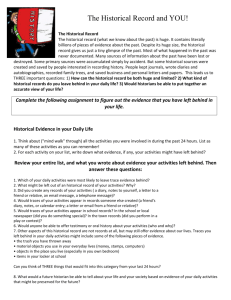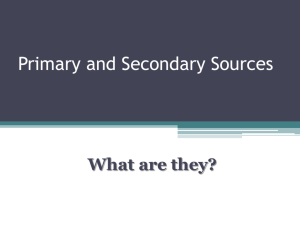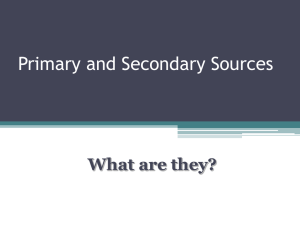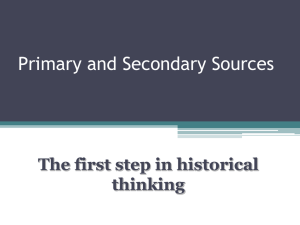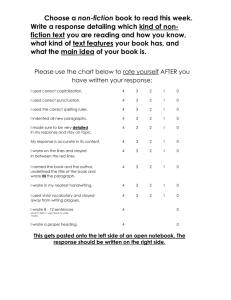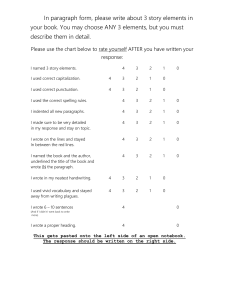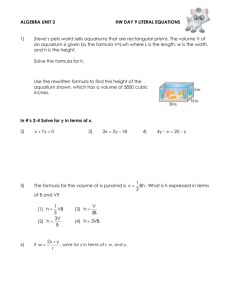Primary Source - Schilling Farms Middle School
advertisement
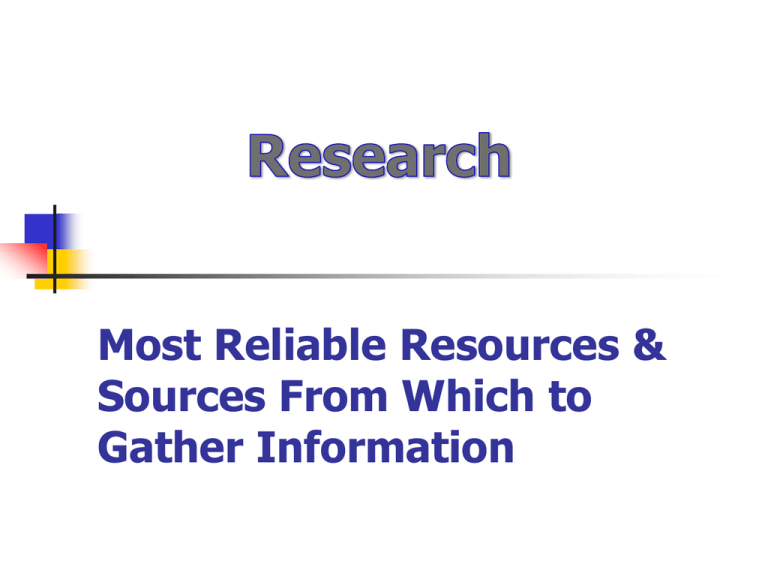
Most Reliable Resources & Sources From Which to Gather Information Most Reliable Resources & Sources From Which to Gather Information I can distinguish between primary and secondary sources. I can distinguish between reliable and unreliable resources. I can use a variety of search engines to locate information. Let’s Begin with a Brainstorm What are some places, types of books, types of media can you use to gather information to write a research paper? 60 seconds to share with your group. Did your list include any of the following? encyclopedia websites library books newspaper articles magazine articles textbooks interviews atlases, almanacs videos, DVDs photos audio tapes letters, diaries Primary and Secondary Sources What are they? Primary sources A primary source is an original object or document; first-hand information. Primary source is material written or produced in the time period that you may be investigating. Primary sources enable the researcher to get as close as possible to what actually happened during an historical event or time period. Primary Source Diaries and journals Example: Anne Frank was a teenager during World War II. She kept a diary or journal the years before she died in a concentration camp. Her diary was later published as the “Diary of Anne Frank”. This is a primary source. Example: Sarah Morgan was young woman during the Civil War. She wrote in her diary or journal what happened to her and her family during the war. This is a primary document because it was first hand. She wrote it at the time it happened. Sarah Morgan Dawson: A Confederate Girl's Diary Primary Source Autobiographies An autobiography is when you write a story or book about yourself. Example: Nelson Mandela wrote his autobiography about events in his life called “Long Walk to Freedom: The Autobiography of Nelson Mandela. This is a primary document because he wrote his first hand experiences. Primary Source Speeches are considered Primary Sources. Examples of Speeches: Abraham Lincoln’s “Gettysburg Address” Martin Luther King’s “I Have a Dream” All of the President’s Inauguration Speeches. Primary Source • Historical documents such as the Declaration of Independence or the Constitution are primary documents. They were drafted and signed. • Other Primary Sources would be • Birth Certificates • Government records • Deeds • Court documents • Military records • Tax records • Census records • Art Primary Source Published first-hand accounts, or stories are considered primary resources. Example: 2008 Presidential candidate Senator John McCain talked about his “own” experiences as a Vietnam prisoner of war. It is a primary source because he was there, experienced the events and shared it first hand. The television stations found footage of Senator McCain at the time that he was released. Those videos are also considered primary sources because it was filmed when it occurred. Primary Source Sound Recordings and interviews are considered primary resources. Example 1: During the Great Depression and World War II, television had not been invented yet. The people would often sit around the radio to listen to President Roosevelt’s war messages. Those radio addresses are considered “primary sources.” Example 2: During the 2008 election Barack Obama, had many interviews that were televised. Those interviews are considered primary sources. Primary Source • Photographs and videos are primary sources. ▫ Example 1: Photographers during World War II took photographs of battles and/or events during the war. Those photographs are primary sources. Those were taken during actual events. ▫ Example 2: The same holds true for videos or film created during an event. A film was made interviewing President Bush. That film would be considered a primary source. Primary Source • Letters are considered primary documents. ▫ Example: Soldiers during wars wrote to their families about war events they experienced. Those letters are considered primary sources. Primary or Secondary Sources? Newspaper and Magazine articles can be a primary or secondary sources. If the article was written at the time something happened, then it is a primary source. Example: The articles written on Barack Obama’s inauguration in 2009 are primary sources. However, if a reporter in 2009 wrote about George Washington’s inauguration using information written by someone else (1789), that would be a secondary source. What is a Secondary Source? • • • • A secondary source is something written about a primary source. Secondary sources are written "after the fact" - that is, at a later date. Usually the author of a secondary source will have studied the primary sources of an historical period or event and will then interpret the "evidence" found in these sources. You can think of secondary sources as second-hand information. Secondary Source Biography Example: A biography is when you write about another person’s life. Alice Fleming wrote a biography on the life of Martin Luther King Jr. This is a secondary document. It was written about him after he died. Secondary Source • Think about it like this…. • • If I tell you something, I am the primary source. If you tell someone else what I told you, you are the secondary source. Secondary source materials can be articles in newspapers, magazines, books or articles found that evaluate or criticize someone else's original research Secondary Source Almanacs, encyclopedias, history books (textbooks), etc. are all secondary sources because they were written “after” the these events occurred. What am I? Primary or Secondary What am I? Primary or Secondary What am I? Primary or Secondary What am I? Primary or Secondary What am I? Primary or Secondary What is better? Internet Sources or Books Wading Through the Web 1. You’ve already compared and contrasted the Internet and books or other texts with your class. Can you think of any other ways they are different? The same? Internet Books/Text •Anyone can publish a Web page •No one checks to see if the information is true or false •Both provide sources of information •There are millions of places to look for information •Both are viewed by •Using the Internet is much quicker millions of people each day •You can narrow down what you’re looking for more easily •The Internet uses search engines •A book has to be published by a publishing company •Editors check and verify the information •Looking for a book can be more time consuming •You have to visit a library •The library uses the Dewey Decimal System Let’s check out online sources. encyclopedia websites library books newspaper articles magazine articles textbooks interviews atlases, almanacs videos, DVDs photos audio tapes letters, diaries Watch BrainPop on Online Sources http://www.brainpop.com/english/writing /onlinesources/ With your group of 4, complete these activities. encyclopedia Which is more reliable? Wikipedia Encyclopedia that lists research data such as World Book websites Which is more reliable? articles written on a school site by students governmental publications blog official site such as Sea World, National Park Service, etc. How do you determine if the information is correct? magazines or newspapers Which is more reliable? editorial governmental publications tabloid magazines library books (textbooks) Which is more reliable? Books copyrighted before 1950’s current books from official sources such as NASA fiction library books (textbooks) Which is more reliable? Books copyrighted before 1950's are fine if you are reporting on an historical topic, but not so good if reporting on a science topic such as space travel. current books from official sources such as NASA fiction letters, diaries, journals, interviews Which is more reliable? letter written by a person who witnessed an event writing from someone who heard about an event Now that we know about sources . . . Let’s check out how to get the most from our internet searches. Brain Pop #2 http://www.brainpop.com/english/studya ndreadingskills/internetsearch/ Choose a partner from another group and complete these activities. Note Sheets & Source Cards Author ____________________________________________________________ Title ____________________________________________________________ Website ____________________________________________________________ Publisher ____________________________________________________________ Location ___________________________________________________________ Copyright date ____________________________________________________________ Date found ____________________________________________________________ Reflect Name one new thing you learned today about sources. Name one new thing you learned about internet research. How can you apply what you have learned during our research on Wednesday and Thursday?
